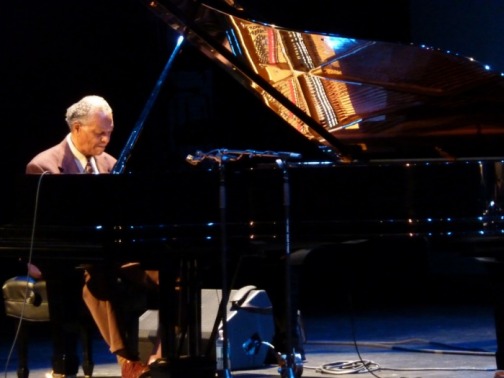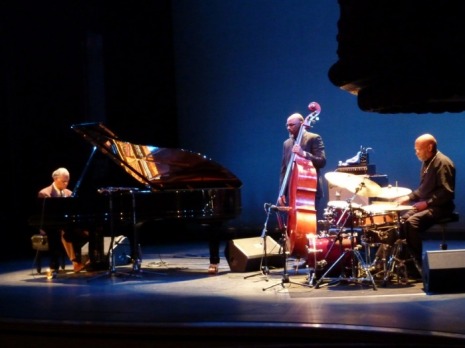Don't Stop 'Till You Get Enough
Published in Berkshire Eagle, 2/23/10
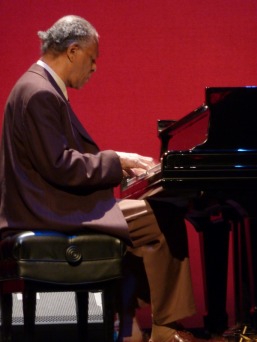
Words and photos by Jeremy D. Goodwin
GREAT BARRINGTON—Thrilling.
Pianist McCoy Tyner has long since earned the right to skate by on heritage, to dutifully collect standing ovations for what he’s done rather than for what he’s doing.
Yet he led his trio at the Mahaiwe Performing Arts Center on Sunday with the hunger and drive of a musician much younger than his own 72 years, one without the sterling discography that’s solidified his legacy among those of the great figures in modern jazz. There was not a whiff of nostalgia or any resting on laurels. Instead, the McCoy Tyner Trio delivered a muscular, endlessly confident display that’s likely to joust for area “best of the year” honors come December.
Tyner, bassist Gerald Cannon and drummer Eric Kamau Gravatt delivered a fierce and riveting performance, squeezing from their 75 onstage minutes more intensity, virtuosity and musical drama than could reasonably be expected.
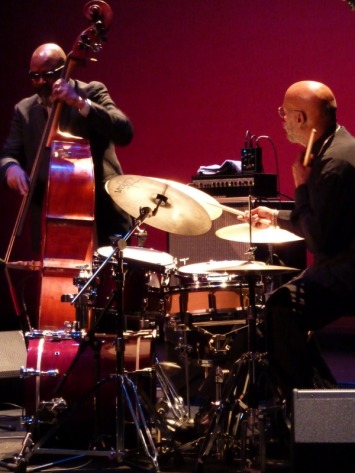
Canon and Gravatt
Gravatt in particular was given wide birth to exercise his chops, provided by his bandleader with an unaccompanied solo in nearly every song. Tyner displayed his bold percussive sense, at times hammering the Steinway grand with his left hand. Employing an unflashy style, Cannon ably held things together.
In his between-song comments, Tyner spoke in a halting, hoarse voice that was frequently hard to decipher. Yet his playing was remarkably assured, anchoring the proceedings while never seeming to outpace his more than capable sidemen.
Mellow but supple opener “Ballad for Aisha” was the closest thing to polite the set, culled largely from the bandleader’s own compositions, would get all night. A high point came with third number “African Village,” off Tyner’s 1968 album “Time For Tyner.” After dispensing rather quickly with the head, the band dropped straight into a spotlight on Gravatt, who delivered a maelstrom of a drum solo. It was an odd way to pace the song, but once Tyner and Cannon joined back in the trio uncorked a fascinatingly tension-filled performance.
Cannon delivered a meditative, mantra-like bassline as his band mates sparred with each other across the stage, playfully locking in for syncopated deliveries of the tune’s centerpiece musical phrase and then diverging again. A second drum solo, this one offering nearly obsessive control where the first offered excess, led back to the theme.
In his between-song comments, Tyner spoke in a halting, hoarse voice that was frequently hard to decipher. Yet his playing was remarkably assured, anchoring the proceedings while never seeming to outpace his more than capable sidemen.
Mellow but supple opener “Ballad for Aisha” was the closest thing to polite the set, culled largely from the bandleader’s own compositions, would get all night. A high point came with third number “African Village,” off Tyner’s 1968 album “Time For Tyner.” After dispensing rather quickly with the head, the band dropped straight into a spotlight on Gravatt, who delivered a maelstrom of a drum solo. It was an odd way to pace the song, but once Tyner and Cannon joined back in the trio uncorked a fascinatingly tension-filled performance.
Cannon delivered a meditative, mantra-like bassline as his band mates sparred with each other across the stage, playfully locking in for syncopated deliveries of the tune’s centerpiece musical phrase and then diverging again. A second drum solo, this one offering nearly obsessive control where the first offered excess, led back to the theme.
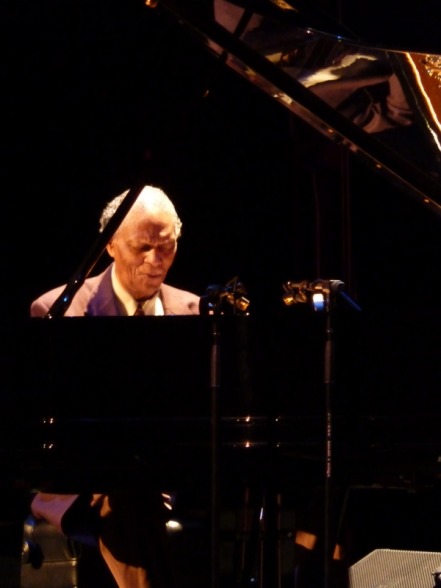
Since the interplay among the three this night was so enjoyable, I would have traded one of Gravatt’s look-at-me monologues for another dialogue with Cannon, like the one offered in show closer “Blues On the Corner.” There, Cannon dipped in and out of Gravatt’s solo without deflecting the spotlight—the sort of loose interplay the genre is built to accommodate.
This was a very dangerous trio operating at what seems to be the height of its powers. The band romped through its set with such cool ferocity, the time seemed to race past; when Tyner rose from his seat to bid farewell to the audience, it came as a surprise. Yes, one might have hoped for an encore to extend the evening a bit. But since what transpired on stage was already so powerful, so satisfying—perhaps it was just enough.
______________________
Comment on this article
This was a very dangerous trio operating at what seems to be the height of its powers. The band romped through its set with such cool ferocity, the time seemed to race past; when Tyner rose from his seat to bid farewell to the audience, it came as a surprise. Yes, one might have hoped for an encore to extend the evening a bit. But since what transpired on stage was already so powerful, so satisfying—perhaps it was just enough.
______________________
Comment on this article
